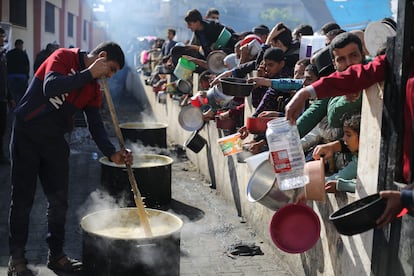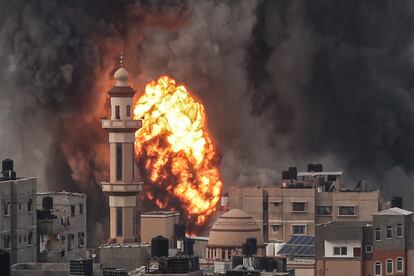Israel and Hamas begin to outline second prisoner-for-hostage swap in Gaza
Hamas leader Ismail Haniyeh traveled to Cairo to take part in the talks. The Islamist movement insists on releasing all hostages in exchange for an end to the invasion, while Netanyahu warns: ‘Those who think we will stop are disconnected from reality’

The dialogue for a second swap of Israeli hostages for Palestinian prisoners, which just a week ago seemed like a distant prospect, has been moving forward day by day since Israeli soldiers killed three of their kidnapped compatriots, whom they believed to be Palestinian militiamen, in a surprising blunder last Friday.
Each revelation about the incident adds pressure on Benjamin Netanyahu’s government to negotiate a second swap, after two and a half months of war in which it has favored massive bombings over the release of the hostages. First it was revealed that the hostages were waving a white flag with a bare chest (to show that they were not hiding weapons) and that one was chased to death in a building while shouting to the soldiers that he was one of their own. Later, the army admitted that the hostages had crafted from cloth and food scraps two messages in Hebrew with the texts, “SOS” and “Three hostages. Help.” The soldiers interpreted them as bait for an ambush.
This Wednesday, the local press reported another finding that adds more salt to the wound. Five days before the incident, the camera attached to a dog from the military canine unit picked up the cries of “Help” from one of the hostages. No one saw the images in real time. The army discovered it too late, last Monday, when it recovered the carcass of the dog (which had been killed by Hamas militiamen before the hostages were gunned down by Israeli soldiers) and reviewed the footage.
Some 130 hostages remain in Gaza, with an unknown number of them dead, following the exchange of dozens for three times as many Palestinian prisoners in the last week of November. Until now, their relatives feared that the hostages would lose their lives in one of the numerous and massive aerial bombardments, that their health would give way to the precarious conditions, or that their captors would murder them. Their new fear is that they will end up being returned in body bags due to excessive zeal, like the three on Friday.

The progress of the dialogue is reflected in the hierarchical positions in which it is moving. Hamas leader Ismail Haniyeh traveled this Wednesday to Egypt (one of the mediators, along with Qatar and the United States) to participate in the negotiations. A delegation from the Islamic Jihad, a smaller and more radical armed group that also participated in the October 7 attack and took hostages, will also travel to Qatar for the talks. Aware of the change of tone in Israel, both Hamas and Islamic Jihad have shifted into psychological warfare in the last 48 hours, releasing videos of hostages in their custody.
It’s also not coincidental that, in the midst of the dialogue in Cairo, Palestinian armed groups have not fired any rockets at Israel since Tuesday afternoon, even though firing has been sporadic for weeks, due to the difficulties the militiamen have in moving, transporting the projectiles and firing them from the surface of an invaded and guarded Gaza.
40 hostages for a week of truce
According to the Walla news portal, Israel is offering a deal of 40 hostages for a one-week truce. It would pick up where the previous one left off: women and children. Then other categories would come in, such as elderly men or people in need of medical care or suffering from certain diseases. Israel would be willing to pay the highest price in terms of prisoner releases, both in number and in profile, as Hamas is demanding. All accompanied, once again, by a temporary ceasefire and the entry of more humanitarian aid. The head of Mossad (Israel’s intelligence services abroad), David Barnea, conveyed the proposal on Monday in Warsaw to the Prime Minister of Qatar, Mohammed bin Abdulrahman Al Thani, and to the director of the CIA, William Burns. Israel expects Washington to exert intense pressure on Qatar, where several of Hamas’ leaders reside, so that the emirate will transfer this pressure on to the Palestinian militia.
U.S. President Joe Biden has sought to downplay the optimism, admitting that he does not expect an agreement any time soon. “We are pushing,” he told reporters during a trip to the state of Wisconsin, according to Reuters.
The main stumbling block is of substance. Hamas insists on a global and definitive agreement: all hostages in exchange for the end of hostilities. One of its leaders, Ghazi Hamad, reiterated this Wednesday that he “will not participate in the game” of agreeing to a new release of hostages to be followed by “another round of mass killings.” The number of Palestinians killed on Wednesday reached the symbolic figure of 20,000, of whom some 8,000 are minors and 6,200 women, according to the Hamas government’s Health Ministry.

Netanyahu, prime minister at the head of a unity government, has responded indirectly, with an eye on growing international pressure to end the campaign or at least — as requested by his indispensable ally the United States — to lower its intensity and enter a phase more akin to fighting an insurgent guerrilla underground.
“We are continuing the war until the end,” Netanyahu warned in a statement. “It will continue until Hamas is eliminated: until victory. Those who think we will stop are disconnected from reality. We are attacking Hamas with intense fire… All Hamas terrorists, from the first to the last, are dead men. They only have two options: surrender or die,” he added.
The continuation of the war would mean, for the Gazans, weeks or months of one precarious meal a day, rationed water and diarrhea from drinking unsafe water. The United Nations agency for childhood, UNICEF, recalled on Wednesday that the hundreds of thousands of displaced children in southern Gaza only have access to 10% of the minimum necessary water for hydration and hygiene. That is, no more than two liters a day. It has also underlined the “critical” state of the water and sanitation systems in the area.
There, in the south, is the city of Rafah, which absorbed, first, all the displaced people from the north, and then those from the heavy offensive by air, land and sea on the city of Khan Yunis, in the south. Many times they are the same people, who were first displaced from the north and then displaced within the south. It has become the most densely populated area in Gaza, which even before the war was the most densely populated place on the planet (2.3 million people) in relation to its size. Rafah is already home to more than 12,000 people per square kilometer, the U.N. Office for the Coordination of Humanitarian Affairs (OCHA) said Wednesday.
Sign up for our weekly newsletter to get more English-language news coverage from EL PAÍS USA Edition
Tu suscripción se está usando en otro dispositivo
¿Quieres añadir otro usuario a tu suscripción?
Si continúas leyendo en este dispositivo, no se podrá leer en el otro.
FlechaTu suscripción se está usando en otro dispositivo y solo puedes acceder a EL PAÍS desde un dispositivo a la vez.
Si quieres compartir tu cuenta, cambia tu suscripción a la modalidad Premium, así podrás añadir otro usuario. Cada uno accederá con su propia cuenta de email, lo que os permitirá personalizar vuestra experiencia en EL PAÍS.
¿Tienes una suscripción de empresa? Accede aquí para contratar más cuentas.
En el caso de no saber quién está usando tu cuenta, te recomendamos cambiar tu contraseña aquí.
Si decides continuar compartiendo tu cuenta, este mensaje se mostrará en tu dispositivo y en el de la otra persona que está usando tu cuenta de forma indefinida, afectando a tu experiencia de lectura. Puedes consultar aquí los términos y condiciones de la suscripción digital.









































